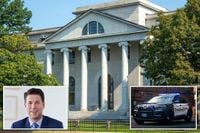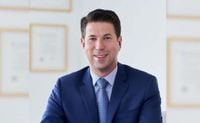On the evening of October 1, 2025, as Yom Kippur—the holiest day in Judaism—began, a quiet Brookline neighborhood near Temple Beth Zion was thrown into chaos. Carlos Portugal Gouvêa, a visiting professor at Harvard Law School and a prominent figure in Brazilian legal activism, was arrested after allegedly firing a pellet rifle outside the synagogue. The incident, which unfolded around 9 p.m. on Beacon Street, has ignited debate about campus safety, gun laws, and the responsibilities of public figures, while stirring anxiety in a community already on edge.
According to police reports cited by multiple outlets including The Boston Globe and Brookline.News, the episode began when private security guards at Temple Beth Zion heard two loud shots. The guards, on high alert as congregants gathered for Yom Kippur services, spotted Gouvêa holding a pellet rifle behind a large tree adjacent to the synagogue. As the guards approached, Gouvêa reportedly set the gun down, but a brief physical struggle ensued when they attempted to detain him. Gouvêa then fled to his nearby residence, where he was later apprehended by Brookline police officers.
During the arrest, Gouvêa told officers that he was “using the pellet rifle to hunt rats in the area,” a claim documented in the official police report and widely reported by The Boston Herald and Brookline.News. Officers found him compliant during the arrest but nonetheless advised him about the safety risks and the alarm his actions had triggered. The police also discovered a parked car next to the synagogue with a shattered front passenger window and what they believed to be a metal pellet round inside—evidence linking the damage to Gouvêa’s actions.
“From what we know, it does not appear this was related to the Temple or an instance of Antisemitism. The proximity to the Temple and the timing (Yom Kippur) appear to be coincidental (Mr. Gouvêa lives in the area),” Brookline Police Deputy Superintendent Paul Campbell told The Boston Herald in an email. Temple Beth Zion’s leadership echoed this assessment in a statement posted to Facebook, saying, “We have no reason to believe this was an antisemitic event.” The statement went on to note that, based on initial information from police, Gouvêa was unaware he lived next to a synagogue or that it was a religious holiday.
Despite these reassurances, the incident triggered a large police response—more than a dozen officers descended on the scene, and the synagogue’s sanctuary went into lockdown. “It was incredibly important that the hundreds of our community members at services that night listened, stayed calm, and remained in the sanctuary throughout the incident,” synagogue leaders later reflected, as reported by The Boston Globe. The temple’s leadership emphasized that their training for such scenarios paid off, ensuring the safety of all present.
Gouvêa was charged in Brookline District Court with illegally discharging a pellet gun, disorderly conduct, disturbing the peace, and malicious damage of personal property. He pleaded not guilty to all charges and was released on personal recognizance, with a court date set for early November. Neither Gouvêa nor an attorney listed in court records responded to requests for comment from local media.
The fallout was swift at Harvard Law School, where Gouvêa had been teaching two courses this fall—one on “Sustainable Capitalism” and another on corruption and inequality. Jeff Neal, a spokesperson for Harvard Law School, confirmed to The Washington Free Beacon and The Boston Globe that “Carlos Portugal Gouvêa has been placed on administrative leave as the school seeks to learn more about this matter.” The university has not announced any further disciplinary action.
Gouvêa’s background adds a layer of complexity to the story. He is not only a visiting professor at Harvard but also an associate professor at the University of São Paulo Law School in Brazil. Notably, he is a founding member of Instituto Sou da Paz, a Brazilian think tank that played a central role in advocating for the country’s strict 2003 federal Gun Control Act. This law, one of the most restrictive in Brazil’s history, made it illegal for civilians to carry weapons outside their homes and required registration with a national database. Gouvêa’s think tank even submitted an amicus brief defending the law’s constitutionality before Brazil’s Supreme Court, which upheld it in 2007. Ironically, while pellet guns are not classified as firearms under Brazilian law, civilians are still prohibited from carrying them in public—mirroring the very sort of regulation Gouvêa once championed.
In addition to his academic roles, Gouvêa serves as CEO of the Global Law Institute, a major Brazilian think tank focused on environmental and social justice, particularly among indigenous communities. According to Harvard Law, his work centers on “high impact research on indigenous communities” and broader issues of social justice in Brazil. When he began his visiting appointment at Harvard in 2022, he taught a corporate ethics class emphasizing “the social efforts to increase racial and gender diversity in companies, and the progress and backlash in the fight against corruption.”
The timing of the incident has heightened sensitivities. It comes amid ongoing national debates about antisemitism on American college campuses, with Harvard recently at the center of political and legal battles. The Trump administration has accused the university of failing to protect Jewish and Israeli students, threatening to withdraw federal funding unless major reforms are enacted. Harvard has pushed back, filing a lawsuit challenging the legality of the funding freeze and arguing in court that the government’s actions were punitive and politically motivated. U.S. District Judge Allison Burroughs ruled that the administration’s stated concerns about antisemitism were a “smokescreen” for broader political disagreements, noting that Harvard had taken steps to address the needs of affected students and staff.
The incident in Brookline also follows a series of violent episodes targeting Jewish communities worldwide, including a deadly attack in Manchester, UK, earlier that week. While officials in Brookline have repeatedly stated there is no evidence of antisemitic intent in Gouvêa’s actions, the context has left many feeling unsettled.
As the investigation continues and the court date approaches, questions remain about the responsibilities of public figures, especially those entrusted with shaping the minds of future leaders. For now, Harvard Law School and the Brookline community are left to grapple with the aftermath of a night that, for a brief moment, upended a sacred occasion and cast a spotlight on issues that reach far beyond Beacon Street.



